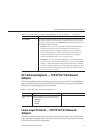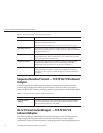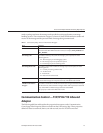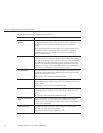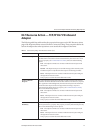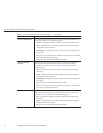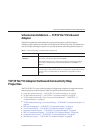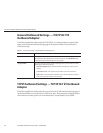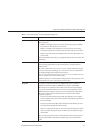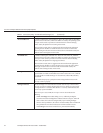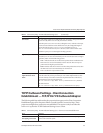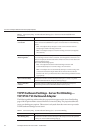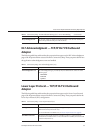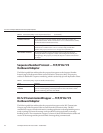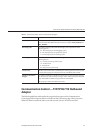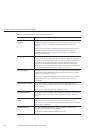
TABLE42 Connectivity Map- TCPIP OutboundSettings (V3)
Name Description
Connection Type The way theadapter establishes the TCP/IP connection. Selectone of the
following options:
■
Client – The adapter connectsto an external server (host/port)to establish
the connection. Theadapter is in active mode.
■
Server – Theadapter waits and listens on acertain port for an incoming
connection request froman external client. Once the requestis received, the
adapter accepts therequest and establishes the connection. Theadapter is in
passive mode.
Server is thedefault setting. Unless you specically requireClient mode, leave the
default value.
ServerSoTimeout The value (in milliseconds) of theSO_TIMEOUT parameter for ServerSocket. The
timeout must begreater than zero (0). A timeoutof zero is interpreted as an
innite timeout.
This value isused for the ServerSocket.accept() method. When thisoption is
set to anon-zero timeout, calling accept() for this ServerSocketwill block for
the congured lengthof time. If the timeoutexpires, a
java.net.SocketTimeoutException (or java.net.InterruptedIOException)
is thrown, butthe ServerSocket remains valid.
Enable this optionprior to entering the blocking operation.This property is only
used when the Connection Type property is set to Server.
KeepAlive An indicator ofwhether the client’s SO_KEEPALIVE option is enabledor
disabled. Select true toenable SO_KEEPALIVE; otherwise, select false.
When the optionis enabled for a TCP socketand no data has been exchanged
across the socketin either direction for two hours,TCP automatically sends a
KEEPALIVE probe to thepeer (the actual value is implementationdependent).
This probe isa TCP segment to which thepeer must respond. One of three
responses is expected:
1. The peer respondswith the expected ACK. The applicationis not notied
(since everything isOK). TCP will send anotherprobe following another two
hours of inactivity.
2. The peer respondswith an RST, which tells thelocal TCP that the peer host
has crashed andrebooted. The socket is closed.
3. There is noresponse from the peer. The socketis closed. The purpose of this
option is todetect if the peer host hascrashed. This is used for theaccepted
client Socket.
Note – Forsome properties, the serversocket itself doesnot have directproperty
settings associated withit. Instead, the properties mapto the accepted client
socket.
TCP/IPHL7V3AdapterOutboundConnectivityMapProperties
SunAdapterforTCP/IPHL7User's Guide 81



